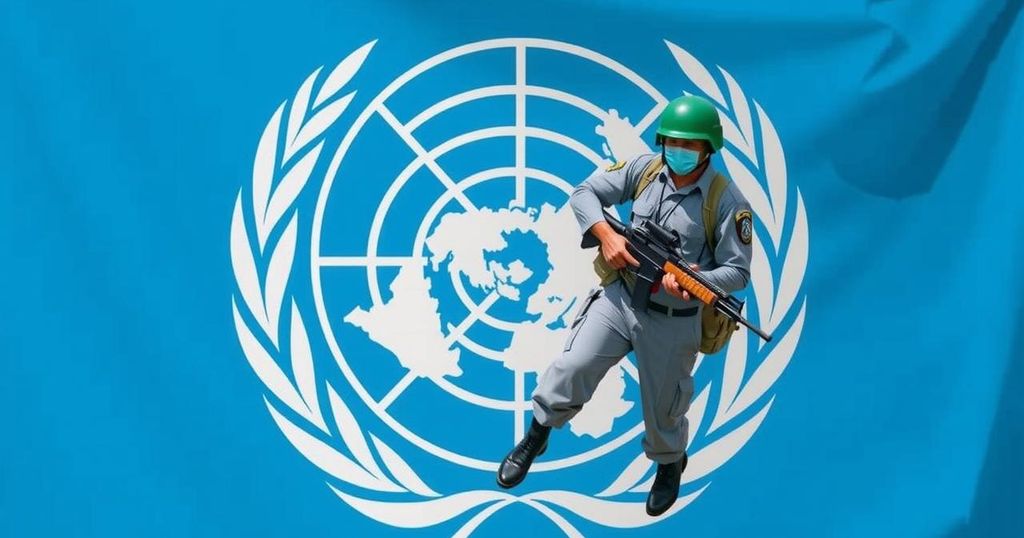Global news
AFRICA, ANTONIO GUTERRES, AP, COUNTERTERRORISM, HAITI, INTERNATIONAL RELATIONS, KENYA, MARIA ISABEL SALVADOR, MILITARY, NORTH AMERICA, SECURITY, SECURITY COUNCIL, TO TRANSFORM KENYA - LED FORCE, TRANSITIONAL COUNCIL, U, N, U. N, U. N. SECRETARIAT, U. N. SECURITY COUNCIL, U. N. TRUST FUND, U. S, UN, UN PEACEKEEPING FORCE, UNITED NATIONS, UNITED STATES, US, WEST AFRICA, WILLIAM RUTO
Jamal Walker
0 Comments
U.S. Intensifies Push for U.N. Peacekeeping Force to Aid Haiti
The United States has intensified efforts to develop a U.N. peacekeeping force in Haiti amid escalating gang violence. The proposal follows increasing attacks and the closure of air traffic to Port-au-Prince. Current funding and resource limitations pose challenges, with the U.S. seeking unanimous support from the U.N. Security Council for this transformation.
The United States has escalated its initiative to transition the Kenya-led multinational force in Haiti into a United Nations (U.N.) peacekeeping mission, a move prompted by a recent surge in gang violence that resulted in the closure of air traffic to Port-au-Prince. Initially proposed in early September, this U.N. peacekeeping mission aims to secure sustainable funding for the multinational force tasked with assisting Haiti’s national police in combating rampant gang activities, which are currently exacerbated by a significant funding shortfall. The intensification of gang violence reached alarming levels last Sunday following the transitional council’s decision to dismiss the interim prime minister amid ongoing political turmoil. Presently, gangs are reported to control approximately 85 percent of Port-au-Prince, leading to the closure of Haiti’s main airport after armed attacks on aircraft resulted in injuries to personnel. In response, the U.S. has sought the unanimous agreement of the 15-member U.N. Security Council on a draft resolution that would set the groundwork for this transformation. President Biden’s administration has urged U.N. Secretary-General Antonio Guterres to promptly initiate planning for the transition to a peacekeeping force, a process that could require several months to complete. Despite the urgency, both Russia and China have communicated reservations about the proposed transition, necessitating a detailed briefing from the U.N. Secretariat before proceeding with any further actions. Additionally, ongoing discussions highlight the challenges faced by the current international police presence, which, having initially anticipated 2,500 personnel, now consists of merely 430 deployed officers—predominantly from Kenya, along with contributions from other nations. Kenya’s President William Ruto has indicated plans to dispatch an additional contingent of 600 troops to Haiti by November. However, the existing U.N. trust fund, which is instrumental in financing the multinational force, currently faces severe resource limitations. The fund has thus far secured $85.3 million out of a pledged $96.8 million, while the U.S. has committed $300 million towards its operations. Nevertheless, this financial support falls short compared to the estimated $600 million required to sustain a robust peacekeeping contingent. Haiti’s alarming rise in gang violence since the assassination of President Jovenel Moïse in 2021 has prompted both domestic civilian responses and international inquiries for aid. In light of these dynamics, Haiti’s leadership has formally requested a U.N. peacekeeping force, bolstered by a favorable resolution from the Organization of American States. The current sentiments about foreign interventions remain mixed, with historical precedents of previous U.N. peacekeeping endeavors in Haiti marked by serious issues such as allegations of misconduct and public health crises. As the conversation progresses regarding the evolution of international military support in Haiti, local populations wrestle with the prospect of renewed foreign intervention, reminiscent of past endeavors that elicited both hope and skepticism.
The situation in Haiti has dramatically deteriorated over recent years, particularly with the assassination of President Jovenel Moïse in 2021, which has precipitated an unprecedented escalation in gang violence and civil unrest. Various international forces have intervened in Haiti throughout its history, notably led by the United States and the U.N. Previous missions have faced severe criticism, notably for failing to protect civilians and for allegations of misconduct. The current U.S.-led initiative seeks to establish a U.N. peacekeeping force that would not only provide security but also restore order and facilitate a return to democratic governance in the nation.
In summary, the U.S. is actively advancing the transition of the Kenya-led force in Haiti into a U.N. peacekeeping mission in response to escalating gang violence. While there is international support for this transition, significant challenges remain due to funding shortfalls and reluctance from key Security Council members. The ability of the multinational force to effectively assist the Haitian National Police remains contingent on the successful transformation into a fully funded peacekeeping operation.
Original Source: www.usnews.com




Post Comment